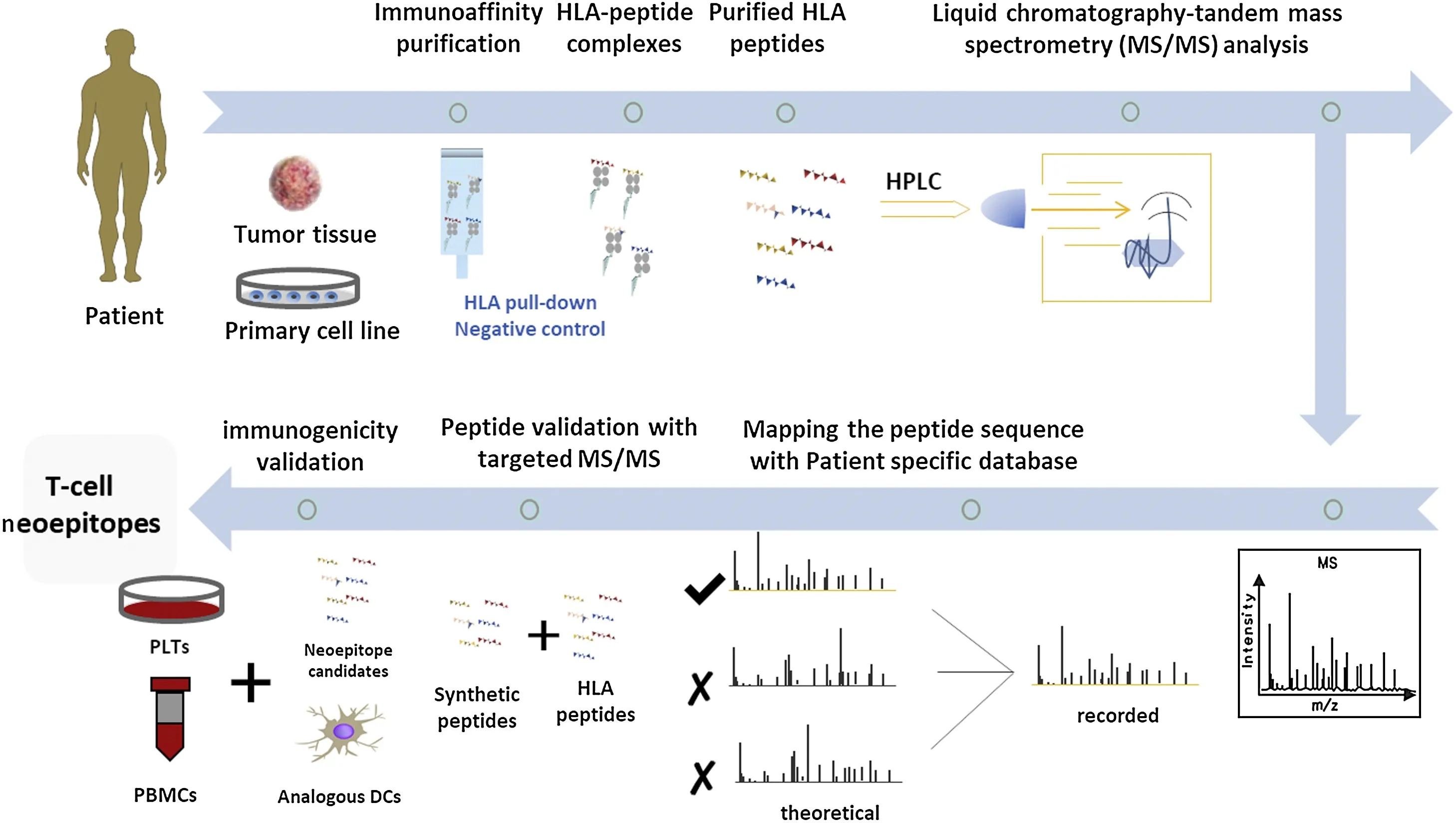Immune Peptide Mass Spectrometry Analysis Service
Immune peptide mass spectrometry analysis is a research method based on high-resolution mass spectrometry technology, primarily used for the systematic identification and quantification of endogenous peptides derived from the immune system. This technique enriches immune-related peptides through immunoaffinity purification, combined with liquid chromatography-tandem mass spectrometry (LC-MS/MS) for sequence identification and abundance analysis, providing deep insights into key biological processes such as immune recognition, antigen processing, and presentation.
Immune peptide mass spectrometry analysis service is widely applied in tumor immunology, pathogen infection research, vaccine epitope screening, T cell epitope identification, and immune monitoring. By accurately analyzing the functional peptides presented by the immune system, it provides critical data support for new antigen discovery, immune therapy target validation, and epitope vaccine design.

Zhang, X M. et al. Biomedicine & Pharmacotherapy, 2019.
Figure 1. Simplified Workflow of Tandem Mass Spectrometry-Based HLA Immunopeptidome Profiling in Patient Samples.
Services at MtoZ Biolabs
Based on high-resolution mass spectrometry platforms, MtoZ Biolabs offers the immune peptide mass spectrometry analysis service focusing on the identification and quantification of endogenous peptides derived from the immune system. This service enriches peptides through immunoaffinity purification, combined with LC-MS/MS for precise peptide analysis. Clients can analyze immune-related peptide sequences, abundance, modification states, and immune function annotations, supporting research in immune response mechanisms, tumor immunology, vaccine epitope screening, and other fields, providing detailed immune-related data support.
Analysis Workflow
1. Immune Peptide Enrichment
Utilizes immunoaffinity purification to selectively enrich specific peptides from immune system-related cells or tissues, ensuring peptide specificity and purity.
2. Mass Spectrometry Analysis (LC-MS/MS)
Employs high-resolution mass spectrometry platforms to precisely separate and quantify enriched immune peptides, obtaining their mass-to-charge ratio (m/z) and abundance data.
3. Data Processing and Peptide Identification
Uses specialized software to process mass spectrometry data, perform peptide sequence analysis, and identify the source antigen and its modification status.
4. Immune Function Annotation and Epitope Analysis
Combines HLA typing information for immunogenicity prediction, T-cell epitope analysis, and provides immune function annotations to support immune research and target discovery.
Sample Submission Suggestions
1. Sample Quantity and Purity
Each sample should be provided in sufficient quantity to ensure there are enough peptides for analysis. The sample should have high purity, greater than 95%.
2. Sample Storage and Transport
Samples should be stored at -20°C or lower and transported with dry ice to prevent degradation. Repeated freeze-thaw cycles should be avoided to maintain peptide integrity.
3. Additional Information
Please provide sample preprocessing details and HLA typing data (if available) to optimize peptide enrichment and analysis parameters.
Service Advantages
1. High Sensitivity and Resolution
Based on high-resolution mass spectrometry platforms such as Orbitrap, this service can precisely detect low-abundance immune peptides, ensuring the accuracy and reliability of the data.
2. Specific Immune Peptide Enrichment
Immunoaffinity purification is used to effectively enrich immune system-specific peptides, ensuring high specificity and purity in the analysis results.
3. Comprehensive Immune Function Analysis
Provides both qualitative and quantitative peptide data, along with T-cell epitope prediction, immunogenicity assessment, and functional annotation, supporting immune research and target discovery.
4. One-Stop Service
Offers a complete service workflow from immune peptide enrichment, mass spectrometry analysis, to data interpretation, simplifying research work and improving analysis efficiency.
Applications
1. Tumor Immunology Research
Immune peptide mass spectrometry analysis service can be used to analyze HLA-presented peptides in tumor tissues, identify potential neoantigens, and provide data support for immune therapy target discovery and immune evasion mechanism studies.
2. Vaccine Epitope Screening
By screening antigenic peptides with high HLA binding affinity within the immune system, this service aids in the design and optimization of vaccine epitopes, enhancing vaccine immunogenicity.
3. T Cell Immune Response Analysis
Immune peptide mass spectrometry analysis service can identify and analyze HLA-restricted peptides recognized by T cells, revealing immune response mechanisms and supporting immune monitoring and immune reaction studies.
4. Immune Mechanism Exploration
By analyzing the expression and modification status of immune peptides, this service provides deeper insights into the immune system’s role in cellular regulation, pathogen recognition, and immune tolerance.
FAQ
Q1: How Do you Ensure the Specificity and Purity of the Peptides?
A1: We use immunoaffinity purification techniques, enriching immune peptides with specific antibodies to ensure that the peptides in the sample originate from specific immune system molecules, guaranteeing high purity and specificity in the analysis results.
Q2: Can Post-Translationally Modified Immune Peptides Be Analyzed?
A2: Yes, if post-translational modification analysis is required, you can contact us in advance. Immune peptide mass spectrometry analysis can identify and quantify post-translationally modified peptides, such as phosphorylation, acetylation, etc. For peptides requiring modification site analysis, we will optimize the detection workflow and data analysis strategies based on customer needs.
Deliverables
1. Comprehensive Experimental Details
2. Materials, Instruments, and Methods
3. Data Analysis, Preprocessing, and Estimation
4. Bioinformatics Analysis
5. Raw Data Files
How to order?







